 Petzlover
Petzlover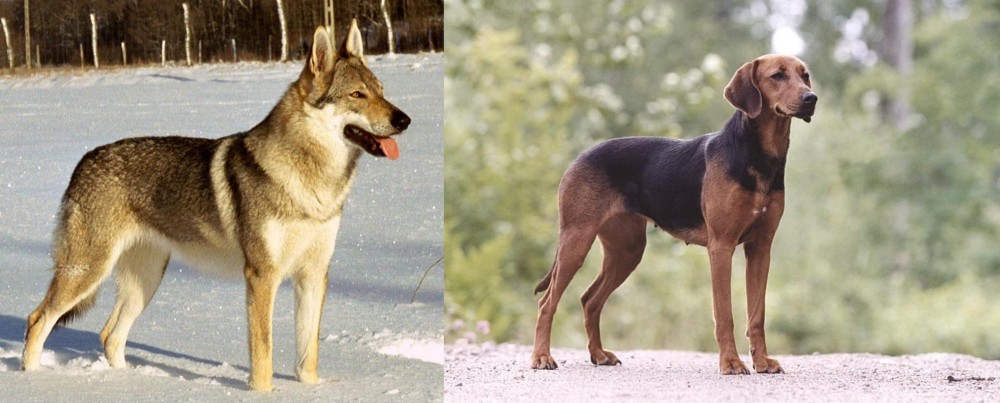 Czechoslovakian Wolfdog is originated from Czech Republic but Schillerstovare is originated from Sweden. Both Czechoslovakian Wolfdog and Schillerstovare are having almost same height. Both Czechoslovakian Wolfdog and Schillerstovare are having almost same weight. Both Czechoslovakian Wolfdog and Schillerstovare has same life span. Both Czechoslovakian Wolfdog and Schillerstovare has almost same litter size. Czechoslovakian Wolfdog requires Moderate Maintenance. But Schillerstovare requires Low Maintenance
Czechoslovakian Wolfdog is originated from Czech Republic but Schillerstovare is originated from Sweden. Both Czechoslovakian Wolfdog and Schillerstovare are having almost same height. Both Czechoslovakian Wolfdog and Schillerstovare are having almost same weight. Both Czechoslovakian Wolfdog and Schillerstovare has same life span. Both Czechoslovakian Wolfdog and Schillerstovare has almost same litter size. Czechoslovakian Wolfdog requires Moderate Maintenance. But Schillerstovare requires Low Maintenance
 The Czechoslovakian Wolfdog is a mix between a German Shepherd and a Carpathian wolf. In fact the Czechoslovakian Vlcak is another name for the Czechoslovakian Wolfdog and Vlcak is the Czech name for a German Shepard dog.
The Czechoslovakian Wolfdog is a mix between a German Shepherd and a Carpathian wolf. In fact the Czechoslovakian Vlcak is another name for the Czechoslovakian Wolfdog and Vlcak is the Czech name for a German Shepard dog.
When you translate the name, it means Czechoslovakian German Shepherd. There was a biological experiment that began in 1955 and these experimental breedings went on for a decade, so that in 1965 a plan was created for the breeding of this new breed.
It was in 1982 that the Czechoslovakian Vlcak was recognized as a national breed in the former Czechoslovakian Republic and recognized by the United Kennel Club in 2006.
This attractive, intelligent looking dog won the title of ‘World Champion’ at the World Dog Show in 1990 and in 1999, the breed met all criteria of the World Canine Organization, earning full recognition of the Czechoslovakian Wolfdog breed.
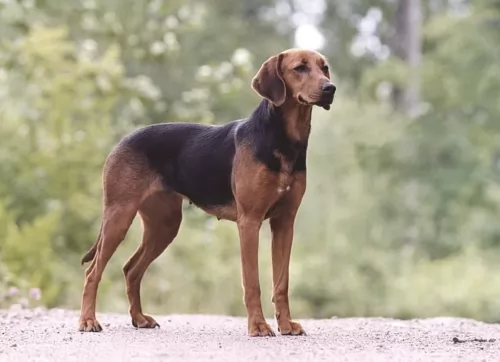 The Schillerstövare originated in Sweden, being named after a Swedish farmer, Per Schiller. After he died, the dog was named Schillerstövare in 1907, and was Sweden's first native dog breed.
The Schillerstövare originated in Sweden, being named after a Swedish farmer, Per Schiller. After he died, the dog was named Schillerstövare in 1907, and was Sweden's first native dog breed.
The Swedish Kennel Club recognised this dog in 1907 and it is also recognised by the Federation Cynologique Internationale as well as a number of minor kennels and dog clubs.
The dog has always been used as a hunting dog and the English Foxhound is the e foundation for this breed.
 The Czechoslovakian Wolfdog looks like a true German Shepherd/Wolf mix with his erect ears, bushy tail and straight, muscular legs.
The Czechoslovakian Wolfdog looks like a true German Shepherd/Wolf mix with his erect ears, bushy tail and straight, muscular legs.
The eyes of the dog are slanted and brown. He stands at about 65cm in height and weighs up to 26kg. The thick coat of the dog is greyish in color but other colors come in as well such as white, cream, black, silver and yellow - all wolf colors. In fact the density of the coat as well as the color changes according to the seasons.
The coat is particularly thick in the Winter, thinning out in the Summer. The coat color may be yellow-gray or silver-gray.
Having a pet which has some wild animal mix can be risky and dangerous. Adding wild animal DNA means that you can get some of the behavior of the wild animal added in and this can be asking for trouble.
When the Czechoslovakian Wolfdog turns on a person, he will be blamed and put down, whereas it is the stupidity of the human to breed such dogs and bring them into their homes in the first place. You need to be careful with children in the home, especially if they don’t know how to treat a dog with respect.
Nonetheless the Czechoslovakian Wolfdog is able to develop a deep relationship with his owner. He is a dog who, when training and socialized, can gets on well with his human family as well as with other pets in the family.
He has got other excellent characteristics such as being fearless and courageous. He is intelligent and learns easily.
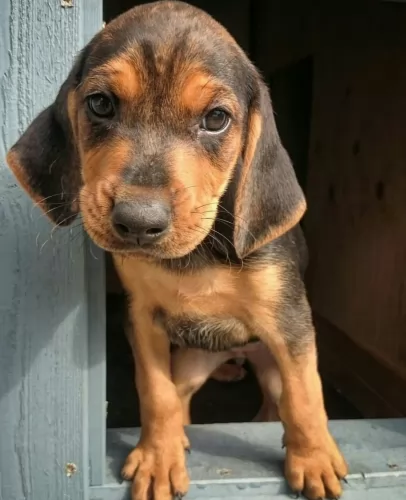 The Schillerstövare is a medium to large sized dog. They’re athletic and muscular.
The Schillerstövare is a medium to large sized dog. They’re athletic and muscular.
Standing at between 53–61cm in height and weighing in the region of 18–25kg, the coat of the dog is fairly short and harsh, with the color being black and tan.Sometimes you’ll see some white markings on the chest and paws.
The head is domed, the eyes brown, bright and alert and the ears of the dog are broad, medium length and floppy. The long tail is carried low or held out when running or alert.
If you allow your Schillerstovare to have puppies, you can expect between 3 to 7.
The Schillerstovare is a calm dog but he can get petty lively when there’s a game to be had. He gets on well with well disciplined children who have been taught to be kind and respectful to animals. He also gets on well with pets in the home. Just like with most other dogs, he will need to be trained and socialized as he is a strong willed, confident, dominant dog.
He is friendly and active but will be somewhat reserved around strangers.These dogs will require a lot of exercise and will need quite a bit of space too. They aren't well suited to small properties in the city. He will need a daily walk but also a chance to get off his leash and run free in the park. Other forms of exercise such as hikes, ball game and swimming will delight him.
 The beautiful Czechoslavakian Wolfdog resembles a wolf and in many of these dogs, their characteristics are wolf-like too. The dog is confident and independent, but it also able to form good relationships with his human family.
The beautiful Czechoslavakian Wolfdog resembles a wolf and in many of these dogs, their characteristics are wolf-like too. The dog is confident and independent, but it also able to form good relationships with his human family.
Many people thrill at the idea of having a pet which has a wild side to him, but there is a price to pay for having such a pet in your home. Their wild side can suddenly come to the fore, with dangerous consequences.
There are so many dog breeds to choose from that surely it isn’t necessary to start tampering with animals from the wild?
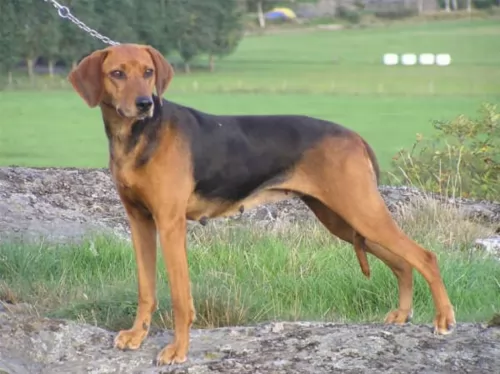 Schillerstovares are social, loving, friendly, loyal dogs who enjoy being around their human family. He’s going to need a lot of exercise, both mental and physical to keep him from boredom and frustration.
Schillerstovares are social, loving, friendly, loyal dogs who enjoy being around their human family. He’s going to need a lot of exercise, both mental and physical to keep him from boredom and frustration.
He will rely on you for at least a daily walk. He is strong-will and confident and will do well in a family where they are active and where they are firm, patient, kind and consistent in their behaviour towards him because then he ticks all th right boxes for being a splendid pet.
 Your Czechoslovakian Wolfdog is a healthy dog who with good health care, can reach the age of 12 to 15 years. However, it is good to be forewarned about some dog sicknesses that your dog might get and which could be detrimental to your dog’s quality of life.
Your Czechoslovakian Wolfdog is a healthy dog who with good health care, can reach the age of 12 to 15 years. However, it is good to be forewarned about some dog sicknesses that your dog might get and which could be detrimental to your dog’s quality of life.
This disease comes about when the ball and socket joint at the hip doesn’t form properly. The bones rub and chafe when the dog moves and the condition just gets worse as time goes on. Your dog can actually end up with arthritis, and worse, become lame.
This is a progressive deterioration of the spinal cord which causes lameness in your pet’s hind legs. It is incurable and can be the end of your pet. The exact cause of this tragic illness is unknown.
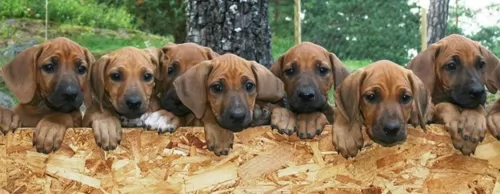 Even though your Schillerstovare is a healthy dog breed, hip dysplasia is a common dog disease that many dogs get.
Even though your Schillerstovare is a healthy dog breed, hip dysplasia is a common dog disease that many dogs get.
This is a skeletal disease when a dog’s hip joints become partially dislocated. It can be very difficult for your dog to get around, and he can also develop arthritis. It gets very sad when your dog doesn’t even want to participate in games anymore.
 Vlcaks have been specifically bred for stamina and if you neglect to exercise him, he’ll become bored and frustrated and possibly destructive and aggressive. He must be trained and he must be constantly provided with lots of exercise and activities.
Vlcaks have been specifically bred for stamina and if you neglect to exercise him, he’ll become bored and frustrated and possibly destructive and aggressive. He must be trained and he must be constantly provided with lots of exercise and activities.
Because of the wolf side of this dog, Czechoslovakian Wolfdogs have a high prey drive, so he will need to be trained and socialized if you want him to get along with your other pets in the home.
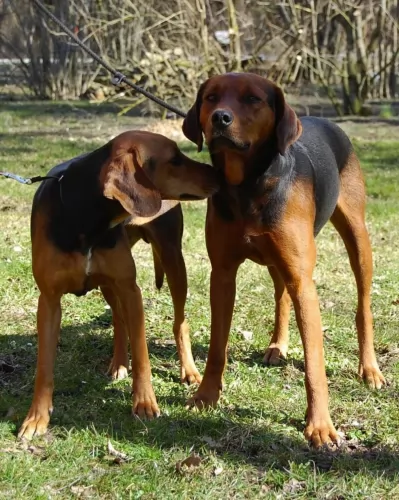 With his short coat, the Schillerstovare is considered a low maintenance dog and requires a minimal amount of grooming. Brushing should be done twice a week to remove loose hair. The harsh outer coat seems to repel dirt and dust.
With his short coat, the Schillerstovare is considered a low maintenance dog and requires a minimal amount of grooming. Brushing should be done twice a week to remove loose hair. The harsh outer coat seems to repel dirt and dust.
Trim your pet’s nails, check inside his ears for signs of redness, make sure his eyes are bright and clear and make sure he doesn’t have any unusual lumps on him.
Make sure his vaccines are up to date to avoid deadly canine diseases. Take him to the vet when you suspect he isn’t his normal self.
Dogs, just like humans, do well on good, nutritious diets. Feed a human lots of junk food and sweets and they’ll grow up to be obese and unhealthy. That's exactly how it is with dogs too. Some of the best commercially manufactured dog foods are convenient and they can be good if you look at the top brands. Look for ones that cater for your dog’s age, size, breed and activity levels. This dry kibble can be made more inviting for your pet when you include some homemade food.
Dogs just want simplicity so that they don’t battle with digestive problems. Boiled chicken, sweet potatoes, brown rice or pasta, carrots and spinach will be wonderful for him when you chop the food up and add it into the dry kibble twice a week. See his tail wag and his brown eyes light up when he smells this treat. Some raw meat added up occasionally will also contribute to your pet’s heath.
Make sure he is never without a constant supply of fresh, cool water.